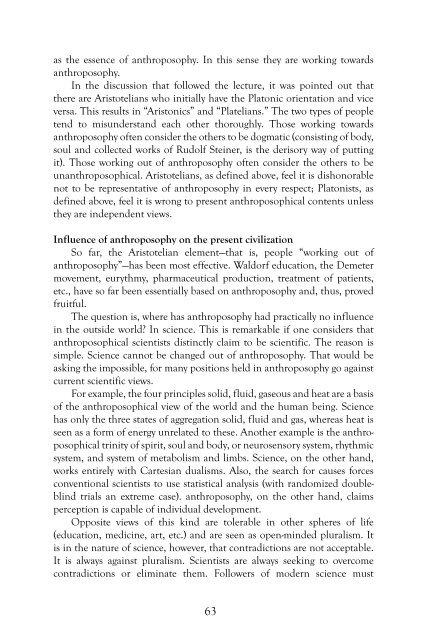When Healing Becomes Educating, Vol. 1 - Waldorf Research Institute
When Healing Becomes Educating, Vol. 1 - Waldorf Research Institute
When Healing Becomes Educating, Vol. 1 - Waldorf Research Institute
You also want an ePaper? Increase the reach of your titles
YUMPU automatically turns print PDFs into web optimized ePapers that Google loves.
as the essence of anthroposophy. In this sense they are working towards<br />
anthroposophy.<br />
In the discussion that followed the lecture, it was pointed out that<br />
there are Aristotelians who initially have the Platonic orientation and vice<br />
versa. This results in “Aristonics” and “Platelians.” The two types of people<br />
tend to misunderstand each other thoroughly. Those working towards<br />
anthroposophy often consider the others to be dogmatic (consisting of body,<br />
soul and collected works of Rudolf Steiner, is the derisory way of putting<br />
it). Those working out of anthroposophy often consider the others to be<br />
unanthroposophical. Aristotelians, as defined above, feel it is dishonorable<br />
not to be representative of anthroposophy in every respect; Platonists, as<br />
defined above, feel it is wrong to present anthroposophical contents unless<br />
they are independent views.<br />
Influence of anthroposophy on the present civilization<br />
So far, the Aristotelian element—that is, people “working out of<br />
anthroposophy”—has been most effective. <strong>Waldorf</strong> education, the Demeter<br />
movement, eurythmy, pharmaceutical production, treatment of patients,<br />
etc., have so far been essentially based on anthroposophy and, thus, proved<br />
fruitful.<br />
The question is, where has anthroposophy had practically no influence<br />
in the outside world? In science. This is remarkable if one considers that<br />
anthroposophical scientists distinctly claim to be scientific. The reason is<br />
simple. Science cannot be changed out of anthroposophy. That would be<br />
asking the impossible, for many positions held in anthroposophy go against<br />
current scientific views.<br />
For example, the four principles solid, fluid, gaseous and heat are a basis<br />
of the anthroposophical view of the world and the human being. Science<br />
has only the three states of aggregation solid, fluid and gas, whereas heat is<br />
seen as a form of energy unrelated to these. Another example is the anthroposophical<br />
trinity of spirit, soul and body, or neurosensory system, rhythmic<br />
system, and system of metabolism and limbs. Science, on the other hand,<br />
works entirely with Cartesian dualisms. Also, the search for causes forces<br />
conventional scientists to use statistical analysis (with randomized doubleblind<br />
trials an extreme case). anthroposophy, on the other hand, claims<br />
perception is capable of individual development.<br />
Opposite views of this kind are tolerable in other spheres of life<br />
(education, medicine, art, etc.) and are seen as open-minded pluralism. It<br />
is in the nature of science, however, that contradictions are not acceptable.<br />
It is always against pluralism. Scientists are always seeking to overcome<br />
contradictions or eliminate them. Followers of modern science must<br />
63

















